How Olympic sailor Mat Belcher’s daughter is the drive behind his business venture Zhik
Sailing legend Mat Belcher broke down when told of his daughter’s Down syndrome diagnosis in 2016. But eight-year-old Amelie is now the inspiration and drive for his latest venture.
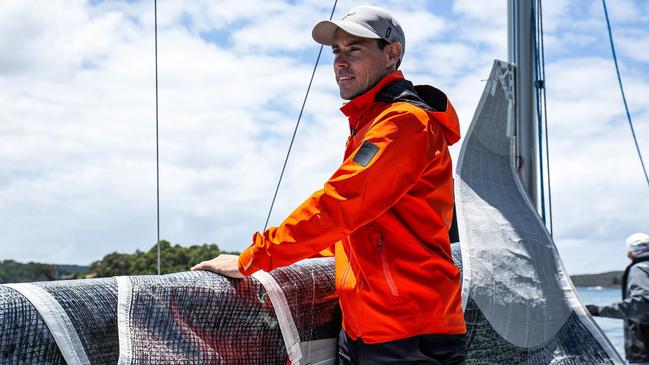
In October 2015, Mat Belcher was on top of the world.
The man regarded as the most successful Australian Olympic sailor in history had just won a record-breaking sixth successive World Championship title.
His victory on the waters of the Mediterranean Sea, off the coast of Israel, also delivered a record 18th title for the Australian Sailing Team’s then head coach Victor Kovalenko.
But back at Belcher’s home on the Gold Coast, the pregnancy of his wife, former German Olympic sailor, Friederike ‘Riky’ Ziegelmayer, was not going well.
Their second child was undersized and wasn’t growing.
Belcher was so concerned that he pulled out of training for six weeks to be with Riky and their son, Anton.
Riky was eventually induced two weeks early and gave birth to an alarmingly small but healthy baby girl they named Amelie.
Belcher will never forget the moment, 10 days later, when he was preparing to be unveiled on Australia’s team for the 2016 Rio Olympics at a press conference at the Middle Harbour Yacht Club in Sydney.
Sitting alongside chef de mission Kitty Chiller in the carpark, he received the news that Amelie had Down syndrome.
“I literally sat in the carpark and cried for an hour,” he tells me stoically of the most painful 60 minutes of his life.
Belcher and Riky, who has a masters in disability services, would never have chosen not to go ahead with the pregnancy had they known of Amelie’s condition earlier, but it was a total shock for the family.
“We did all the testing and everything else. Nothing, nothing came up. We were in that 0.001 per cent of people,” he says, acknowledging that for a time he was angry they had not been prepared for what life would throw at them.
“It was an emotion that kind of went through my mind, yes. But it is hard to process at the time. Knowing what I know now, I would have had a very different reaction. I think most families that are on a similar journey would feel the same.”
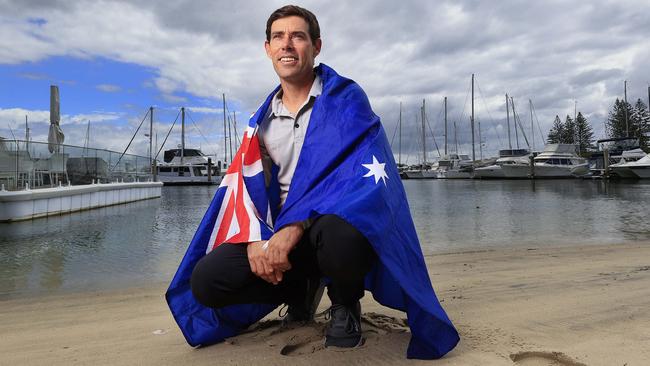
Nine months out from his second Olympic Games, Belcher thought deeply about pulling out of the team. But he decided to push on to support his good friend and mentor Kovalenko and his sailing partner, Will Ryan.
“I also didn’t want Amelie, at a later date, to feel that we had spent the better part of what at that point was 15 years of campaigning, and being so close to another Olympics, that she would be the reason that I didn’t compete. I didn’t think that was fair,” he declares.
The family relocated to Hamburg to be close to Riky’s parents – there, her father Sebastian’s company, Ziegelmayer, is one of the primary boatbuilders for the 470 sailing class – and Belcher got back into training for Rio.
While he felt the stress in his personal life subsequently impacted his performance and he could have done better in Rio, where he and Ryan won a silver medal, he says the support he received from his sailing partners and the Olympic team more broadly was amazing.
Determined to do better in Tokyo in 2021, he and Ryan blitzed the field to win the gold medal.
That day, and for the previous decade, Belcher had been sponsored by the Australian sailing apparel company, Zhik. He was one of more than 100 elite athletes who had worn Zhik’s jackets, gloves and harnesses across the world.
Zhik had been created in the Sydney garage of entrepreneur Brian Connolly, the founder of music tech firm Lake Technology, which was bought by British-American audio tech giant Dolby and became Dolby Australia in 2004.
Connolly got to know Belcher well and thought he was a was a natural fit for Zhik, so Belcher was approached to join the board when he retired after the Tokyo Games.
In September 2022, Belcher moved from being a director of Zhik to chief executive of the firm that now kits out the best sailors in the world, including the America’s Cup and Olympic-winning teams, and six out of 10 SailGP teams.
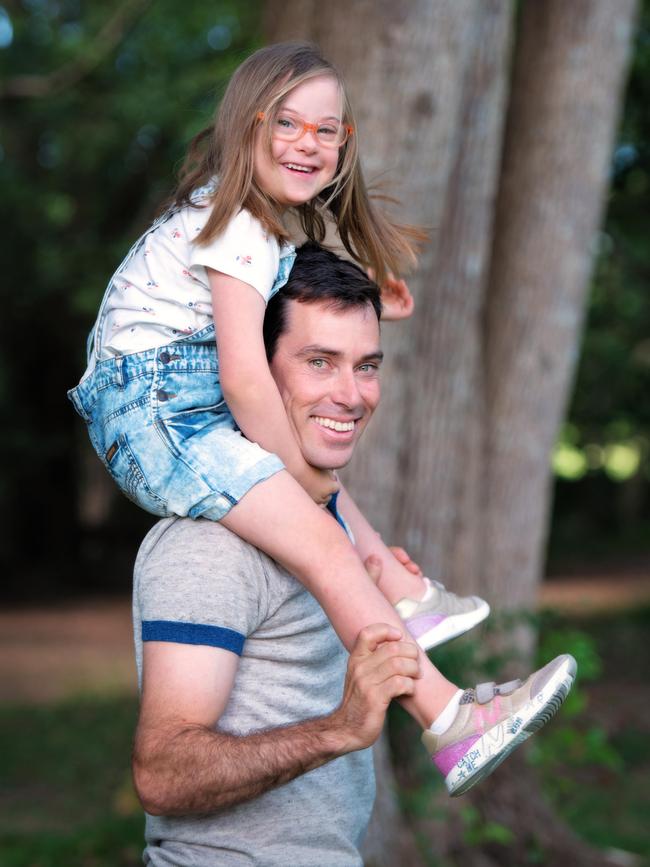
Zhik is currently supplying Australia’s Olympic sailors in Paris with high-performance neoprene-free wetsuits made from Yulex, a sustainable plant-based rubber.
The suits are also infused with graphene nanoparticles, giving them superior thermal insulation, comfort, durability, and mobility, while generating 80 per cent fewer carbon emissions than conventional neoprene suits.
Zhik’s parent company is Sydney-based private equity firm Nightingale Partners, and one of its big backers is Marcus Blackmore, who has been the major shareholder in Australia’s largest vitamins company, Blackmores for decades.
Belcher says he agreed to be Zhik’s chief executive because of his passion for the brand and the business.
“I’ve got a deep understanding of the products, the network and the industry,” he says.
“In particular, I have lived and breathed the products, so authenticity has been a big thing for me in the role.”
Family focus
Belcher grew up on the Gold Coast and was only six years old when he started sailing in a 10-year-old dingy tied to the back of his parents’ boat. A year later he competed in his first race at the Southport Yacht Club in 1989.
His father, John, worked in property development and with wife, Jane, ran a number of hotels and resorts in Queensland. Belcher junior also did several small-scale property developments of his own.
In early 2010 at the age of 69, John decided to step down from the helm of the business, known as Sands Management, and retire.
By then his son had spent a decade in sailing but had missed the Olympic team twice, and there was the opportunity for him to take over the family business.
Curiously, he had no ambition to go onto the international professional sailing circuit to compete in races such as the famed Sydney to Hobart. His only dream was to go to the Olympics.
“It was just a kind of critical cut-off point really; I had to make a decision,” Belcher recalls.
“My parents heavily supported my aspirations to go to the Olympics, even though I’d spent 10 years trying and had little to show for it at that time. So in 2011 we sold the business.”
Property remained in his blood. In 2018, he completed a double masters degree in project management, property development and valuation while campaigning for the Tokyo Olympics.
Then in 2022, well into retirement, John and Jane bought the home next door to their son, daughter-in-law and four grandchildren at Palm Beach – just north of Currumbin – on the Gold Coast.
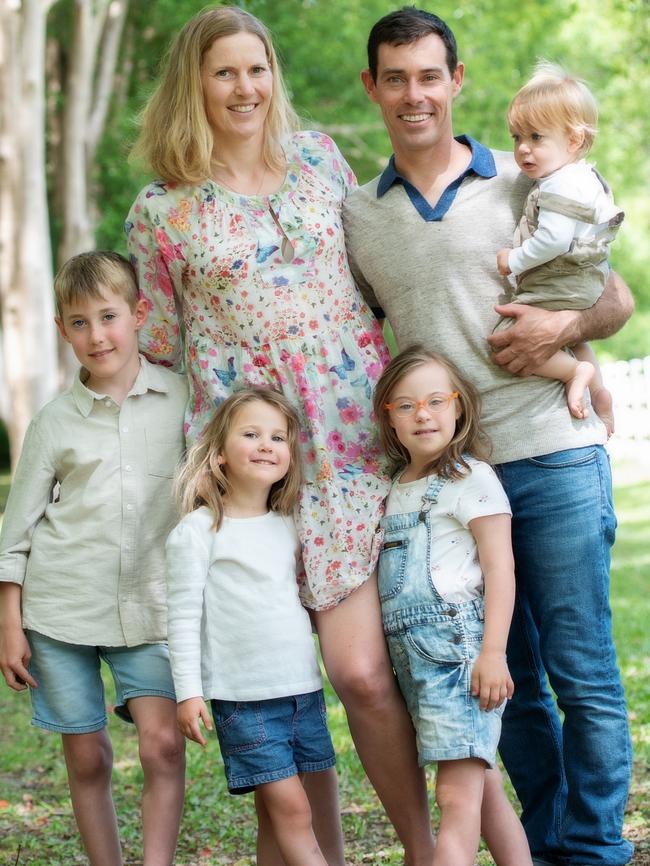
The family is very close. Which their son says made telling his parents about Amelie’s condition “really, really emotional”.
“They knew something wasn’t right through the journey. They helped take care of our oldest boy, Anton, because of the regular medical checks and visits to hospital we had to make before Amelie was born,” he says.
“There was just so much uncertainty throughout that period, before and after she was born, and diagnosed. Certainly it was one of the toughest periods I’ve ever been through.
“Because you don’t know. There’s the anxiety and the pressure of wanting to provide the support and just trying to control something that you can’t.”
Fast-forward eight years and Amelie is now tremendously fond of her grandma and grandad. Their deep involvement in her life offers her a sense of routine and most importantly, safety.
She attends Elanora State School, which is committed to inclusive schooling practices, meaning students with disabilities are able to participate in education on the same basis as other students.
While Amelie today is only as tall as a five-year-old, she recently learned to ride a bike for the first time, which thrilled her dad.
“A lot of people don’t quite recognise how significant a milestone that is. Most kids will learn to ride a bike at six years old. For her to do that was just extraordinary and I think the lessons and things that she is teaching us as a family, and me individually, are just incredible,” Belcher says.
He and Riky have now been together since they were both 20 years old. They both competed as sailors at the London Olympics in 2012. He will be ever thankful for her commitment, trust and love.
“We’ve learned a lot from each other, from the extremity of the highs and lows of competing in Olympic sports to the family aspect of our lives, and supporting each other in all of those things,” he says.
“She has sacrificed a lot for the family and for me. She’s been incredibly, incredibly supportive.”
Olympic focus
In July last year, 180 Australian and New Zealand investors injected $2m into Zhik through a crowd-funding campaign, which valued the business at $25m.
“As such a specialised brand, we have a lot of passionate customers globally, and we wanted to reward that. It was a different way to raise capital,” Belcher says.
First to support the raising was avid sailor Blackmore, a regular visitor to Zhik’s Sydney office who privately sponsored Belcher and Will Ryan in their Olympic campaigns.
Nightingale Partners also topped off a decade of supporting Zhik by doubling down on its investment.
Over the next year or so, the business will look to raise a further $8–10m in the European and American markets to fund its global expansion. Australia and New Zealand only represents 12 per cent of its $20m of annual revenue.
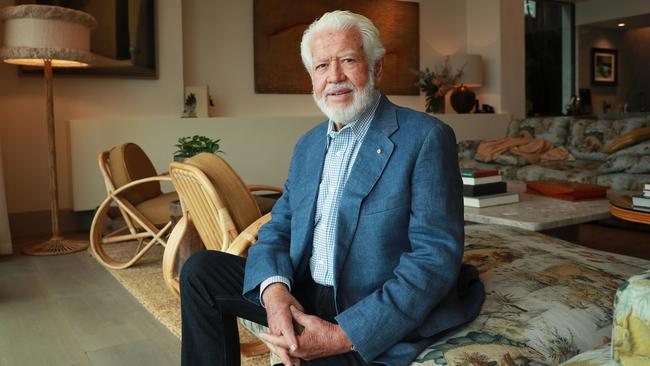
Zhik now has 50 staff servicing more than 50 companies globally.
“We have pivoted into some new segments; for example we have signed partnerships with Paddle Australia and Paddle New Zealand,” Belcher says.
“We’ve made some big steps to cement ourselves working with some of the big marine distributors in the world. The scale of the opportunity is astronomical.”
His sporting career taught him the power of discipline and commitment, which is now integral to his business life. But most importantly, he says he learned the importance of focus.
“It doesn’t matter how much funding you have or how many sponsors, as you get closer to competition day, you just have to perform. There’s no second chance, so the focus is really important. You can only do so many things within that time,” he says.
“I think that translates well to business because you need to align the team, you need to have the bigger vision or strategy in place, then you need to bring everyone on the journey, getting that right level of synergy that everyone is working towards the same goal and 100% committed.”
Belcher retired from competition with two Olympic gold medals, a silver medal and 10 world titles. He was deeply honoured to be selected as Australia’s flag bearer for the Tokyo 2020 closing ceremony.
But the most special moment of his life remains the day Amelie was born.
“She puts things into perspective, no matter how challenging things are, whatever the circumstances,” he says proudly.
“You come home and you see the enjoyment on her face, despite what she’s working through. Some of the most simplest tasks in life are actually some of the most difficult for her.
“You come back into this little world, this family that we’ve created where we are there to support each other.
“Things will always be OK. If she is so determined, so committed and so focused, then there has always got to be a way to solve any of my problems.”






To join the conversation, please log in. Don't have an account? Register
Join the conversation, you are commenting as Logout